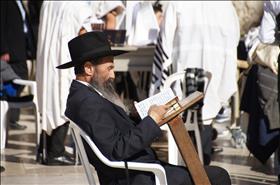The paradigm is broken and unsustainable, economically and socially
"The orthodox status quo in Israel cannot hold any longer"
We were gratified to read a recent op-ed in the popular conservative Canadian National Post written by Canada’s former Ambassador to Israeli Vivian Bercovici. She subsequently made Aliyah and now resides in Tel Aviv.
23/10/2019 22:32
Tags: Hiddush in the press · National Post · 2019 Israel Religion & State Index · Israel Religion & State Index

Ultra-Orthodox Jew at Western Wall, source: tdjgordon (pixabay.com)
We were gratified to read a recent op-ed in the popular conservative Canadian National Post written by Cananda’s former Ambassador to Israeli Vivian Bercovici. She subsequently made Aliyah and now resides in Tel Aviv. Under the title “The orthodox status quo in Israel cannot hold any longer” the writer connects Hiddush’s recent Israel Religion & State Index, which caught her attention, with the current challenges facing Israel. Her conclusion, as is ours, is that the clash of religion & state is high on Israel’s list of challenges. It has become tolerated and has almost become perceived as part of the elements, which, as she writes, “cannot hold any longer.”
Upon reading her article, we reached out to Ms. Bercovici to make her acquaintance. It was thus that we learned of a recent, more detailed analysis she published in Commentary Magazine. Meeting with her reaffirmed our long-held conviction that the pursuit of religious freedom and equality is a critically important, unifying mission that does not divide the political left and right (nor does it divide, as we have demonstrated, Jews across the religious denominational spectrum, so long as they subscribe to democracy). We were also gratified to see once again how Hiddush’s analysis and surveys travel far and wide, helping activists and journalists validate their views and provide deeper insights into what makes Israelis tick.
We are pleased to share with you some selections from her recent articles and look forward to working with her on a shared vision of Israel and world Jewry, which celebrates religious freedom, equality, and diversity:
- Democracy and the importance of shared state values are far less important in Haredi culture than in modern Orthodox, traditional, or secular communities in Israel. They believe that Torah learning should take precedence over shared democratic commitments.
This is a fight for the soul and future of Israel in a way that no other has been since 1948. The 63 percent cannot and will not continue to submit to the path of least resistance that has prevailed since 1948; to submit to the demands of the ultra-orthodox. The paradigm is broken and unsustainable, economically and socially.
- Non-Haredi Israelis see the present with significant trepidation, never mind the future. The Haredi population stands at 12 percent currently and is projected to grow to 15 percent by 2027. The burden to be placed on the rest of the population is not only inequitable but financially and ethically unsustainable.
- Likud effectively lost approximately eight mandates in the September election, approximately 20 percent of its Knesset clout. The message would seem to be that even diehard Likud supporters are not enamored of the ultra-orthodox alliance. What the 63 per cent, many of whom are Likud voters, want — and likely expected — was that Likud would find a way to negotiate a coalition with Blue and White and, perhaps one or two additional small parties, but leave the ultra-orthodox on the outside, to reconsider their intransigent positions and extreme entitlements.
- This is a fight for the soul and future of Israel in a way that no other has been since 1948. The 63 percent cannot and will not continue to submit to the path of least resistance that has prevailed since 1948; to submit to the demands of the ultra-orthodox. The paradigm is broken and unsustainable, economically and socially. This is what the election was and is really about: whether Israel will emerge a more mature and confident democracy, or concede, further, to the destructive power of a theocratically inclined minority.